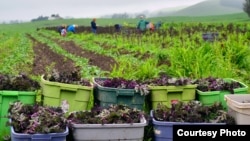The statistic has been repeated so often, it might have lost its potency: up to half of the food the world produces is thrown out, rather than eaten.
But wasteful consumers in wealthy nations are not the only culprits. Poor countries, too, are tossing out perfectly good food, sometimes at the same scale, according to Elliot Woolley, lecturer in sustainable manufacturing at Loughborough University in Britain.
What’s notable, though, is that developed and developing countries have different causes and solutions for their waste, whether it’s food or any other items that could wind up in landfills.
In poor places like Chad, Woolley said, food is usually lost while still in the field or during storage and transportation, thanks to business inefficiencies. Once the produce is sold, families tend to eat everything they buy. That’s in contrast to British, American, and other consumers, who discard as much as half of their food purchases.
“I think this is a disgrace,” Woolley said Wednesday at the 13th annual Global Conference on Sustainable Manufacturing, this year hosted by the Vietnamese-German University.
Similarly, rich and poor nations have different ways of preventing waste -- in other words, recycling. Australia and Britain, for instance, recycle 30-40 percent of their garbage, compared with just 10-20 percent in Vietnam and Malaysia, said Brendan Moloney, a doctoral candidate in engineering at Australian National University.
And yet in the latter countries recyclers make far more money, Moloney said in a presentation at the conference, because infrastructure costs are lower, as are wages among the informal sector of trash pickers. Plus, some recyclables like glass and metals can fetch international prices, no matter the geography where they’re retrieved.
“You end up with a much more profitable industry in emerging markets,” Moloney said.
Smartphones and full pantries
Such variation among countries calls for tailor-made solutions. Woolley’s answer to food waste? There’s an app for that. He built the “Pantry App” to help users track their groceries, which he said cut food waste by 34 percent.
The results were based on a very limited experiment, monitoring food over the course of one week. The app would inform people of how many groceries they bought, when they expired, and how to combine remaining ingredients through recipe tips.
But one person who attended the presentation said more should be done to prevent shoppers from buying so much food to begin with. Jeremy Bonvoisin, a postdoctoral candidate at the Technical University of Berlin, said customers are willing to squander food because they value it so little.
“The problem is that the inventory is becoming too big because the value of food is getting cheaper,” he said.
Bonvoisin said the Pantry App might help those who already want to make a change, though it could also encourage them to waste more because they no longer have to pay attention to how much food they buy. They outsource that to the app.
“I think at some point it may have some perverse effects,” he said.
Trash picking economics
As for recycling, Moloney said developing countries should improve health and safety conditions, while still benefiting from informal recyclers. Because trash pickers are separating their finds by hand, they can extract a greater variety of recyclables, such as textiles and different copper types, rather than just the traditional paper and plastic.
Advanced nations rely on machines, which can do basic categorizing by material type and color, whereas pickers can also sort by size and shape. Moloney said richer states can use economies of scale -- that is, combine recycling in larger facilities -- so they have the capacity for more sophisticated sorting.
Still, Moloney praised rich countries for recycling ever more materials because they have strong policies in place. He showed data for the United Kingdom, which now recycles more than 25 percent of trash, compared with 6-7 percent two decades ago. But he could not contrast that with developing countries, which he said tend not to keep such statistics.








